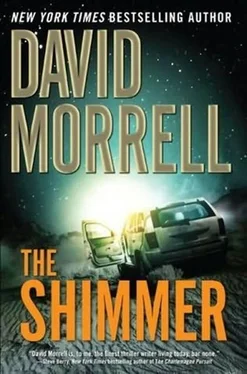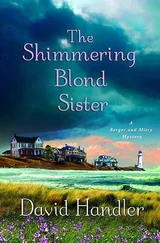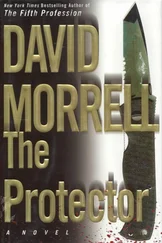Curious, Page and Tori did what Harriett suggested. Stepping around the corner, Page gaped. All he faced was more grassland.
“There isn’t any house,” Tori said in astonishment.
“The only part they built was the front.” Page couldn’t get over his surprise. “In the movie, you feel like you can walk right into the place.”
“Seeing’s believing,” Harriett told them. “But what you see isn’t al- ways what’s real.”
Like the cuttlefish, Page thought. “You’re making a point about the lights?”
“Eye of the beholder,” Harriett answered. “Sometimes we see what we want to see, sometimes what we ought to see, and sometimes what we shouldn’t see.”
“I don’t understand.”
“A lot of people in town were extras in the crowd scenes in Birthright, back when they were kids. Ask around, and you’ll hear all kinds of stories about what it was like to have movie stars walking the streets of Rostov.”
“What does that have to do with the lights?” Tori asked.
“For about three months, the stars lived right here in town. Rostov was even smaller back then, and everything the actors did was pretty much public knowledge, not that any of it was terribly shocking. There was so little to do that the film crew-including the actors- played baseball every Sunday afternoon against a team the townsfolk put together. People invited the actors to barbecues. Every evening, the director put up an outdoor screen and showed everyone the foot- age he’d shot a couple of days before. Did you know that all three of the stars were only twenty-three years old?”
“Twenty-three?” Tori echoed. “But they look like they’re in their forties and fifties for half the film.”
“The director had two choices: hire forty-year-old actors and use makeup so they’d look young in the early parts of the movie, or else hire young actors and use makeup to age them. The fame of Deacon, Pageant, and Rivers made him decide to appeal to a younger audience. The acting and the makeup were so brilliant, they convinced you that what you saw on the screen was real.”
“More illusion,” Page said. “Okay, I get it.”
“That’s not the point I wanted to make, though,” Harriett continued. “Deacon starred in only three movies. First, he played the younger brother in a family that runs a fishing boat in northern California.”
“The Prodigal Son,” Tori said.
Harriett nodded. “Then he made the street-gang movie, Revolt on Thirty-second Street. And finally Birthright. He filmed all three back- to-back, but he died in a car crash before any of them were released. He never had a chance to find out how big a star he was.”
“I knew he died young, but I had no idea it was before his movies came out,” Page said.
“The waste,” Tori said. Something in her voice made Page wonder if she was thinking about her own disease. “All the other great movies he might have made.”
“At the time, his fans were convinced that he hadn’t really died in the car crash,” Harriett went on. “They believed he was disfigured, that he hid from the public so he wouldn’t shock people and ruin his legacy.”
She paused, bracing herself for what she wanted to say.
“Deacon was a troubled farm boy from Oklahoma. His mother ran away with the hired hand. His father was as stern and joyless as the father in The Prodigal Son. As a teenager, he rebelled to the point that he was accused of stealing a car and almost went to reform school. A teacher got him interested in acting in high school plays. He loved it so much that he found several part-time jobs, saved a hundred dollars, and hitchhiked to New York City, where he convinced Lee Strasberg to let him audition and was allowed to take classes at the Actors Studio.
“What people tend to forget is that at the beginning of Deacon’s career, he played bit parts in a couple of movies, but he never made an impression. He had secondary roles in a lot of live television plays, and no one paid attention to those, either-deservedly. Even though he studied with Strasberg, he was terrible. Awkward, dull, lifeless. If he hadn’t been so good-looking, he probably would never have been hired.
“Finally he became so discouraged that he gave up and drove his motorcycle across the country. That was in the summer of ’56. By the fall, he was back in New York, where he managed to persuade a casting director to give him a small part in a Broadway play. Suddenly he was acting so brilliantly that a Hollywood talent scout gave him a screen test for a small part in The Prodigal Son. The test was so spectacular that the director asked for a second one and then gave Deacon the starring role. According to the DVD of the movie, that’s one of the great success stories in Hollywood history. What do you sup- pose made the difference?”
Page shrugged. “I guess the motorcycle trip gave him a chance to get focused.”
“Or maybe he had help,” Harriett said.
“Help?”
“That summer, Deacon was on his way from El Paso to Big Bend National Park. That’s southeast of here. He happened to drive into Rostov.”
Tori stepped forward. “He saw the lights?”
“He spent most of August and all of September here. Every night, he drove out to the observation area, which wasn’t even a parking lot back then. And every night, he stayed until dawn. Then he drove back into town and slept in a tent he’d put up in the park. Late afternoons, he went around town and made friends. He was so good-looking, I don’t imagine that was difficult. Then one day he was gone, returning to New York and his big break.”
Page frowned. “You’re saying the lights had something to do with it?”
“They were the only thing that was different in his life,” Harriett replied. “I can imagine him staring at the lights for all those weeks. Night after night. Spellbound. In Deacon’s earlier roles, his eyes are dull. In his last three films, they glow. When he was hired to be one of the stars in Birthright, he told the film’s director about Rostov and how the area around here would be perfect for location shooting. He was so persuasive that the director came out to take a look and instantly decided to build the ranch house-right here.” She gestured at the ruined structure. “Seems awfully coincidental that we’re ten miles from the section of road where Deacon first saw the lights.”
“Did the director see the lights, too?” Page asked.
“No. Local people who worked on the movie remember that Deacon went there every night and dragged Pageant, Rivers, and the director with him several times. They had no idea what he was talking about. The crew members didn’t get it, either, and finally Deacon was the only one who went out there.”
Harriett drew a breath.
“He didn’t need makeup to look older,” she finally said.
Despite the heat, Page felt a cold ripple on his skin. “What do you mean?”
“The director shot the movie in sequence. As Deacon was supposed to look older, he actually did look older. The rumor on the set was that he was drinking and taking drugs every night instead of watching the lights, as he claimed. He began to look so wasted that the director begged him to stop abusing himself. There was talk of shutting down the picture and sending Deacon to a hospital to dry out. But every evening, when the town gathered to watch scenes from a few days earlier, Deacon looked so perfectly in character, so real in the part, that the director kept filming. The makeup people needed to use all their talents to get Pageant and Rivers to look as believably older as Deacon did.”
Standing in the shadow of the ranch house’s ruin, Tori asked, “What made that happen?”
“All I can tell you is that when Deacon finished his last scene and drove away on his motorcycle, people say he looked sixty years old,” Harriett answered. “Five days later, he was killed driving his sports car to a race in northern California near where he’d filmed The Prodigal Son. He was going a hundred miles an hour when a pickup truck pulled onto the road. A witness saw sunlight glinting off the truck’s windshield. The theory was that the glint blinded Deacon and kept him from being able to steer around the truck.”
Читать дальше












